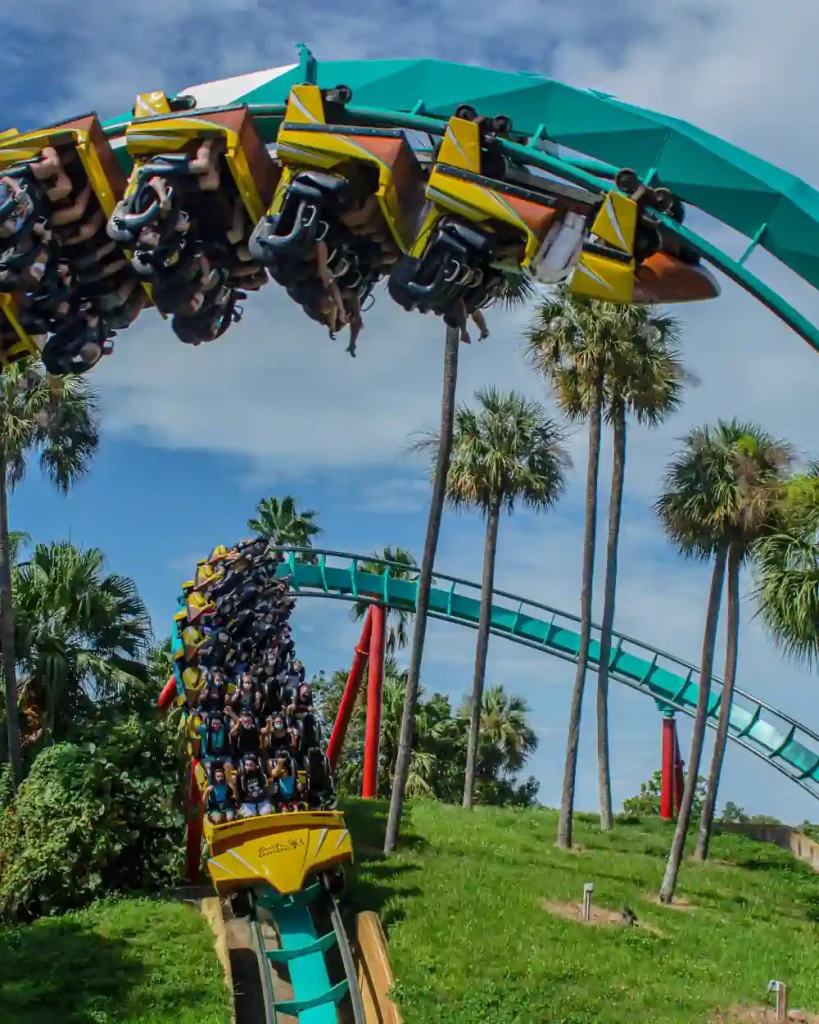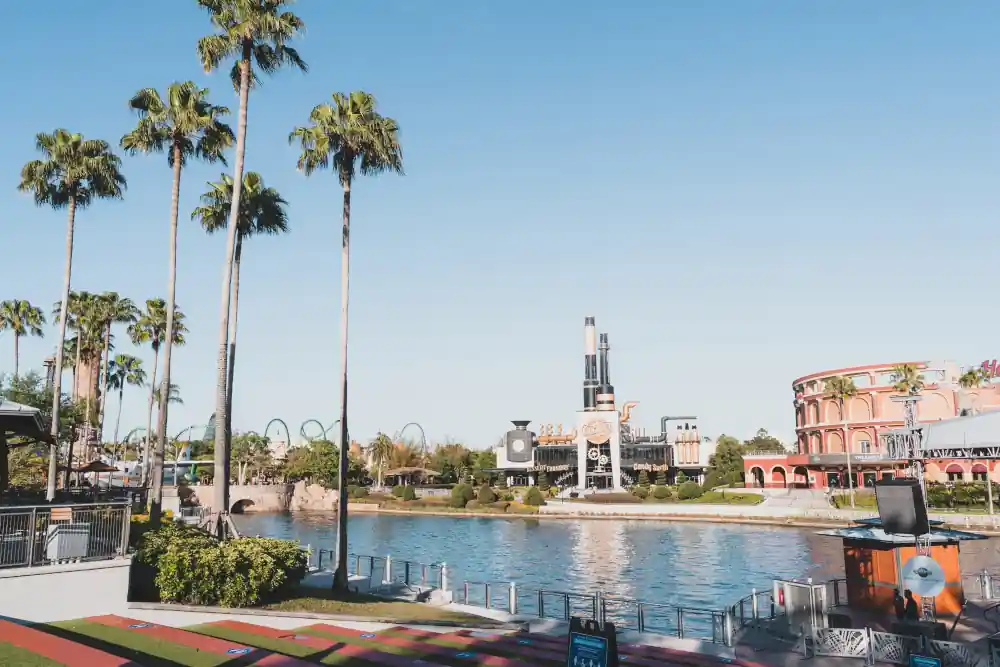Driving in Florida
By James | Last updated December 8, 2023
This page may contain compensated affiliate links. Please read the Disclaimer for more information
Like most of Europe, Americans drive on the right. If you hire a car it will almost certainly be automatic (see Car Rental/Hire for more details).
A lot of terminology to do with driving is different between the USA and Europe, for example what the Americans call gas, Europeans will call fuel or petrol (see Terminology for more examples).
Rules of the Road / Highway Code
The highway code is pretty universal but there are a couple of significant differences.
Firstly, unless a sign is posted, you are allowed to turn right on a red traffic light as long as you come to a complete stop and there is no traffic approaching from the left. Note that many intersections have “red light” cameras to enforce the law.
Secondly, if you should come across a school bus that has stopped with its lights flashing, then you must stop, even if you are travelling in the other direction. The only time this rule does not apply is if you are on a dual carriageway and the bus is travelling in the other direction.
Read more about Florida School Bus Stop Laws.
Seat Belts and Young Children
Both the driver and other front seat passengers must wear a seat belt and all passengers under the age of 18 must be restrained either by a seat belt or a suitable child restraint system.
Florida has been slow to bring out legislation regarding child safety in cars and campaigners have been fighting for years to get Florida’s laws updated. Safety experts recommend that children up to the age of 8 or 4 feet 9 inches tall should use a booster seat.
Up until June 2014, Florida only required that children up to the age of 3 be restrained in a special baby seat. Now children between the ages of 3 and 6 must use some form of “child restraint device” such as a booster seat or a five-point harness.
If you are renting a car and have small children then make sure you either bring the appropriate seat with you or ask the rental company to include it in your rental.
You also need to be especially careful during the hot summer months and not be tempted to leave young children in a car whilst you go off and run an errand or do some shopping.
Between 30 and 50 children die each year in the USA as a result of being left in a car for a period of time. Florida is one of only 19 states that have passed laws on this issue.
In Florida the law states that a child younger than 6 years cannot be left in an unattended vehicle for more than 15 minutes.
Intersections (Junctions)
Most intersections are controlled by traffic signals which are usually hung on cables stretched across the road but on smaller suburban streets you may come across a ‘four-way stop’ where again you must come to a halt and wait your turn before proceeding.
To reduce accidents, many intersections now have cameras mounted on the stop lights and drivers who “run a red light” can expect to receive a citation.
Perhaps surprisingly, there are also around 75 roundabouts in Florida including several in Kissimmee. One is next to the Monument of States and the other at the exit to the Lake Buena Vista shopping centre.
In the past, some states had what were called rotaries or circles but they were generally much larger than the more European style roundabout.
If you do come across a roundabout, approach it with extreme caution as many drivers do not understand how to negotiate a roundabout and they have been the scene of numerous accidents. Some local TV stations even show daily public service broadcasts on how to negotiate a roundabout.
Basically, like in the UK, you should yield to traffic already on the roundabout and only enter the roundabout when the route is clear.
Move Over Law
To help protect law enforcement officers and emergency workers, Florida has introduced a “Move Over Law”.
If a police car, emergency vehicle or tow truck is parked with its lights flashing then all drivers must move out of the lane closest to the vehicle to give the vehicle a wide berth if there are two or more lanes in the direction you are travelling. If this is not possible then the driver must slow down to at least 20 mph below the posted speed limit.
From July 1, 2014 the law was changed to also include utility service and sanitation vehicles. Basically any kind of public service vehicle.
Violators may be issued with a citation and a fine of around $120.
Using Mobile (Cell) Phones
Florida is one of the few states in America where it is not illegal (though certainly not recommended) to use a mobile (cell) phone while driving.
A law has recently been passed that does now make it illegal to text whilst driving and carries a $30 fine plus court costs. Bizarrely you can still legally text when stopped in traffic or waiting at traffic lights.
It is also only defined as a “secondary” offence which means to be charged you would first have to be pulled over for another “primary” offence such as dangerous driving or speeding.
In late 2017, it was announced that the Florida Legislature is shortly to consider making texting a primary offence.
Lights
Lights must be used at dawn and dusk and in low visibility or heavy rain. Some rental cars have automatic lights which come on when it starts to get dark.
You are very unlikely to encounter ice but beware of skidding on greasy roads after heavy rain, known locally as ‘Florida ice’ !!
Hazard Lights
There is a temptation amongst some drivers to turn on their hazard lights when driving in poor visibility particularly in very heavy rain that is common in Florida. It is illegal to do this and you could be liable to a fine of about $115. Hazard lights must only be used when the car is stationary at the side of the road and in need of assistance. This can lead drivers to think the car is stopped when it is not.
On some models of car, brake and turn indicators are disabled when the hazard lights are on which makes it even more dangerous.
Overtaking on Freeways
Though Americans have the concept of slower traffic keeping to the inside lane, they are more relaxed about lane discipline and overtaking.
When there is heavy traffic on multiple carriageways be particularly careful of cars ‘undertaking’; i.e. overtaking on the inside.
However a new law was introduced in 2013 which means you can be fined $121 if you are travelling in the left-hand (outside) lane at more than 10 mph slower than the posted speed limit and are holding up traffic trying to overtake.
Drinking and Driving
As in any country, you should be sensible about drinking and driving. The legal limit in Florida for anyone aged 21 or over, is a blood alcohol content of 0.08% (same as the UK). For drivers under 21 this limit is 0.02% which would be just one drink for most people.
Note that Florida State law prohibits the carrying of alcohol in the cabin of a car; all alcohol must be placed unopened in the boot (trunk).
Road Networks
Main roads in Florida are basically county roads, state roads, highways, US highways or Interstates. All main roads are numbered and as a rule of thumb, even numbered roads traverse the state east-west and odd numbered roads go north-south.
Interstates and other main highways now use mile-marker exit numbers rather than purely sequential.
There are a number of toll roads in Florida like the 417 that passes by Orlando International Airport. Always make sure you have some loose change (quarters) as some of the toll booths are un-manned. You will also come across toll roads where you need an electronic pass. Most rental companies offer these when you go to pick up your rental car so it is worth checking in advance if you are likely to drive on any of these roads.
Read more about Florida’s Toll Roads.
Gas (Petrol)
Distances are measured in miles and fuel is measured in US gallons (slightly smaller than a UK gallon). You will not find service stations on the actual main Interstates but at most junctions (intersections) there will be number of petrol stations, restaurants and motels.
At some petrol stations you can pay for your fuel using a credit card at the pump but sometimes you need to pay in advance inside the station. Not all credit cards are accepted at the pump; some pumps will ask for your ZIP code which is no good if you do not live in the United States.
Amtrak Auto Train
If you live in the North East of the United States, you can even put your car on the Amtrak Auto Train to avoid the long drive south.
Florida Theme Parks
Theme Park Ticket Guides
Popular Articles







![Beauty and the Beast topiary at Disney Epcot [© 2019, floridareview.co.uk, all rights reserved]](https://floridareview.co.uk/wp-content/uploads/2018/10/beauty-beast-topiary.jpg)







